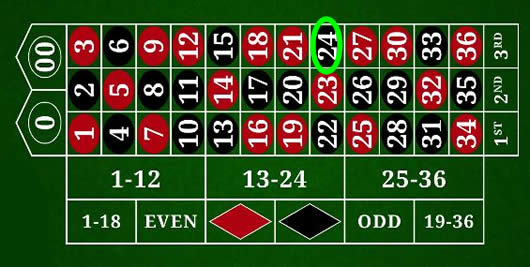Once wagers are made on the roulette table, the dealer gives the wheel a spin to commence a game of roulette. Subsequently, players drop the ball onto the moving wheel and watch to see where it lands. Roulette offers a wide variety of bets, like selecting an individual number, a set of numbers, or the hue of the pocket where the ball will stop. Before getting started, beginners should familiarize themselves with the basic rules and strategies of the game.
Also, because roulette can be an addictive game, it's critical to establish and stick to a financial boundary. Before playing for real money, beginners can boost their confidence and practice their techniques by understanding the game's basics and training with free online games. Even though roulette is a chance-based game, there are still methods you can use to enhance your winning chances. A commonly used strategy is the Martingale strategy, which entails double your wager following each loss.
This can be hazardous, but if you have a sizable enough bankroll, it can also produce considerable gains. The D'Alembert strategy is an other method that means upping your wager following a unsuccessful bet and reducing it by one unit following a successful bet. Although this system is thought to be less dangerous than the Martingale system, wrong application can still lead to financial setbacks.
Apart from these approaches to betting, there exist certain other tips and tricks that players can utilize to increase their odds of success when playing roulette. Selecting the European version of roulette over the US counterpart is a important tip because the European version has better probabilities since it doesn't include a double zero slot. Focus on even-money wagers, like choosing red or black, as these have the most favorable chances. This is another piece of advice. It's essential to set and maintain boundaries for yourself.
This means establishing a budget for the funds you're prepared to wager on roulette and sticking to it, as well as a time limit for how extended your gameplay will be. Also, it's critical to know when to give up since pursuing losses can result in even greater losses. Maintaining strict limits helps players avoid getting trapped in problem gambling. Developing good financial planning strategies is a key strategy for roulette. To remain in the game despite setbacks, this entails staking a fraction of your available funds on each spin.
Being aware of when to stop is also vital, notably if you are on a losing streak. Players who plan their wagers carefully can prevent losing all of their money in a brief duration. Since the roulette is fundamentally about probabilities, players can improve their skills by learning about these ideas. In roulette, the kind of wager made determines the probability of winning. For instance, there is reduced odds when betting on an exact number, but the potential gain is large when it comes through.



Advanced strategies are there for those with more gameplay knowledge to help them elevate their performance. Wheel bias analysis is one sophisticated strategy that entails examining the wheel to look for any flaws that might influence spin results. If well-executed, this strategy can produce notable rewards, but it also needs a focused attention and a high level of persistence. Tracking ball movement is an alternative advanced method that foresees the ball's final destination by applying sight-based signals like the wheel and ball's speeds.
If mastered, this tactic can be extremely accurate, but it does call for a great deal of experience and ability. Even though these are not allowed in most casinos, there are tools and devices that can be employed to help in determining outcomes. To enhance your success rate at roulette, you can utilize betting plans in combination with these methods. A widely-used betting approach is the Fibonacci method, which entails placing bets on a series of numbers where each figure is determined by adding the previous two.
Another commonly used betting approach is the Labouchere approach, which involves recording a number sequence and wagering based on this sequence. While playing roulette can be thrilling and profitable, it's important to exercise responsible gambling & effectively manage your bankroll. This involves deciding the total budget for gambling & the duration you will invest in the game.
It also requires knowing when to stop if you are losing a lot of money because betting to recoup money can lead to bigger setbacks. It's crucial to resist increasing bets to recover lost money, which is when you raise your bets in an hope of regaining lost funds. This can easily escalate and result in even greater losses. You can stay out of this trap and manage your gambling by setting and adhering to boundaries for yourself.
Understanding when it's time to ask for support if you realize your gambling habits are escalating is another crucial component of playing safely. Individuals struggling with compulsive gambling have access to a range of help services, such as therapy and group therapy sessions. Addressing the issue promptly can help you break the cycle of compulsive gambling and manage your gaming before it becomes a major issue. To conclude, although roulette is a game of chance, there are still tactics and tricks that can be applied to raise your chances of success.
Roulette players can enhance their abilities and raise their chances of winning by learning the fundamentals of the game and practicing prudent bankroll management. Also, it's essential to bet responsibly and know when to seek help if your gambling habits become problematic. Players can unleash their inner gambler & elevate their play at the roulette table by remembering these insights and tactics.
FAQs
How is roulette played?
Roulette is a well-known casino game where players bet money on a specific number, various groupings of numbers, the colors red or black, whether the number is odd or even, or if the numbers are in the high range or within the low range.
What are simple strategies for roulette?
Some fundamental roulette tips are betting on red or black, choosing odd or even numbers, or high or low numbers to increase the chances of winning. Players can also try the Martingale betting strategy, where they increase their stake twofold after every loss.
Can you explain the Martingale method?
The Martingale approach is a popular wagering method where the player increases their wager twofold after every unsuccessful bet, with the aim of gaining back lost money and making a small win.
Are there any other popular roulette tactics?
Alternative betting methods are the D'Alembert method, the Fibonacci sequence, and the Labouchere method. These methods consist of modifying stakes based on previous outcomes to enhance winning odds.
Can you win at roulette every time?
The short answer is no, there is no certain strategy to always win. The game is a luck-driven game, and while betting methods can enhance winning potential, there is always a risk of losing. It's essential to play within your means and avoiding excessive risks.